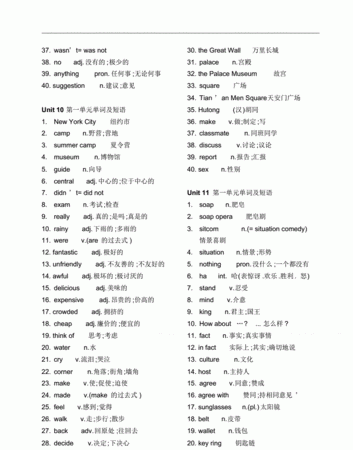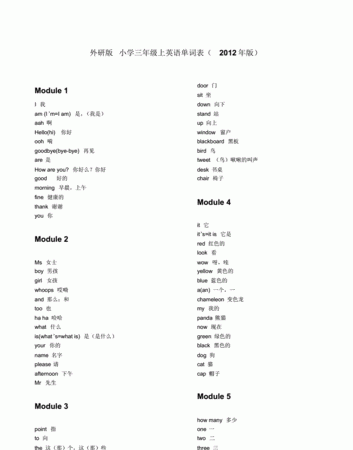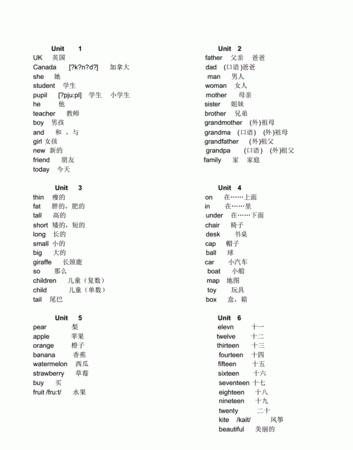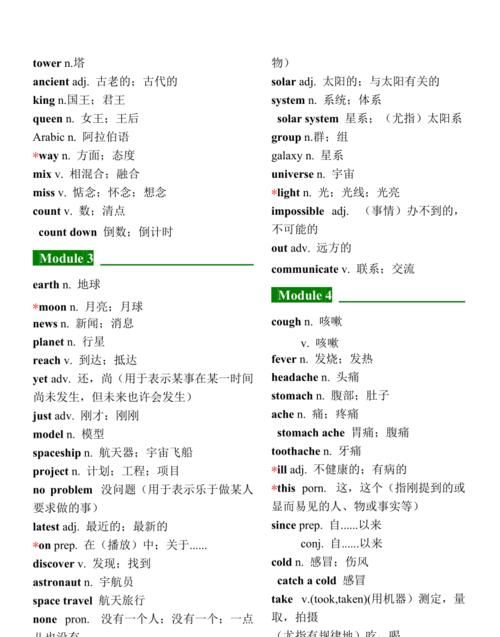本文目录
小学英语入门基础单词
小学英语初级入门单词有哪些?数字、动物、动作这三类单词是必学的。如果家长问课程顾问入门单词学哪些,他们都会回答:“像动物,老虎之类的单词啊······”但是这些单词怎么让孩子牢牢记住呢?孩子又该怎么学呢?
在游戏中学习
爱玩是孩子的天性。孩子上课注意力不集中,老是想着玩。那我们怎么解决呢?就用游戏来把孩子的注意力拉回来。比如数字游戏,这类单词其实可以和小学数学融合在一起,跨科教学,一节课堂达到学两门课程的效果。
如果家长没有足够的时间陪伴孩子学习英语,可以把孩子交给线上的英语培训机构。线上英语培训机构如培训机构都是趣味教学模式,每节课都有大量的动画游戏,帮助孩子学习英语。
用歌谣帮助记忆
朗朗上口的英文歌谣,孩子容易学习,还可以培养英语语感。学习这件事,我们还讲究触类旁通。能够接触旁的东西,让孩子下意识想到英语单词。而歌谣中不仅仅包括了小学英语初级入门单词,还有一些简单的语法。好的老师也会在这方面稍稍引导孩子思考,诸如“英文句子为什么这样构成”的问题。
有趣的老师有趣的课堂
老师上道,才能够创造有趣的课堂,才能调动孩子英语学习积极性。有趣的老师能够利用自己的肢体语言,来模仿动物的动作,从而帮助孩子加深动物单词的记忆。有趣的老师,教学方式多变灵活,整个课堂变得灵动起来,而不是传统教学中死板地把英语单词灌输给孩子。
培训机构的外教会多种教学方法,如TPR全身肢体反应教学方法,把肢体动作融入到小学英语初级入门单词中,带着孩子一边做肢体动作一边学习单词,让单词形象化、具象化。培训机构还有各种各样的教学活动,让孩子参与进去,体验到英语学习中有趣的地方。
小学英语初级入门单词有哪些?培训机构的教材全面覆盖小学英语初级入门单词,用绘本、动画游戏、歌谣等多种方法帮助孩子加深记忆。该机构的外教也会讲故事的方式,把入门单词自然地进入孩子的脑海,孩子学习起来不费力而且不知不觉中国就把这些单词全部记住了。

教我一些简单的英语单词
PEP英语三年级(上册)三会单词
Unit 1:pen (钢笔) pencil (铅笔) pencil-case ( 铅笔盒) ruler(尺)
Eraser(橡皮)crayon(蜡笔)book (书)bag (书包)sharpener (卷笔刀)
school (学校)
Unit 2: head (头) face( 脸) nose (鼻子)mouth (嘴) eye (眼睛) ear (耳朵) arm (胳膊) finger (手指) leg (腿) foot (脚) body (身体)
Unit 3:red (红色的) yellow (黄色的) green (绿色的) blue (蓝色的) purple (紫色的)white (白色的)black (黑色的)orange (橙色的)pink (粉色的) brown (棕色的)
Unit 4:cat (猫) dog (狗) monkey (猴子) panda (熊猫) rabbit( 兔子)duck (鸭子) pig (猪) bird (鸟)bear (熊) elephant (大象) mouse (老鼠) squirrel (松鼠)
Unit 5:cake (蛋糕) bread (面包) hot dog (热狗) hamburger (汉堡包) chicken (鸡肉) French fries (榨薯条) Coke (可乐) juice (果汁) milk (牛奶) water (水) tea (茶) coffee (咖啡)
Unit 6:one (一) two (二) three (三) four (四) five (五) six( 六) seven (七) eight (八) nine( 九)ten( 十) doll (玩具娃娃) boat (小船) ball (球)kite (风筝) balloon (气球) car (小汽车) plane (飞机)
PEP英语三年级(下册)三会单词
Unit 1:boy (男孩) girl (女孩)teacher (教师)student (学生)this (这个)my (我的)friend (朋友)I’m=I am (我是)nice (好的;愉快的)good morning (早上好)good afternoon(下午好)meet (遇见;碰见)goodbye (再见)too (也;太)
Unit 2:father (父亲爸爸)dad (爸爸)(口语)mother (母亲;妈妈)mom 妈妈(口语)man (男人)woman(女人)grandmother (外)祖母grandma (口语)(外)祖母grandfather(外)祖父grandpa (口语)(外)祖父sister (姐妹)brother(兄妹)let’s=let us (让我们)great (太好了)really (真地;确切地)and (和;并且)how (多么;怎么样)
Unit 3:eleven (十一)twelve( 十二)thirteen (十三)fourteen (十四)fifteen(十五)sixteen (十六)seventeen (十七)eighteen (十八)nineteen (十九)twenty (二十)how many (多少) can (能够;可以)look at (看;瞧)
Unit 4:peach (桃)pear (梨)orange (橙子)watermelon (西瓜)apple (苹果)banana (香蕉)strawberry (草莓)grape (葡萄)like (喜欢)some (一些;某些)thanks (多谢)
Unit 5:bus (公共汽车)bike (自行车)taxi (出租车)jeep (吉普车)desk( 课桌)chair (椅子) walkman (随身听)lamp (台灯) your (你的;你们的)
zoo (动物园)
Unit 6:small (小的)big (大的)long (长的)short (短的;矮的)tall (高的)giraffe (长颈鹿)deer (鹿)
PEP四年级(上册)四会单词词汇表
Unit 1: window(窗户) board(写字板)light(灯,灯管) picture(画,图画)door (门)floor(地板 )classroom(教室)computer(计算机)teacher"s desk(讲台)wall(墙)fan(扇子,电扇)classmate(同学) have(我们)有 new(新的) go(去) where (在......哪里) many(许多的) our(我们的)clean(打扫,清洁,擦干净的) good idea(好主意) have a look(看一看) all right(好吧,好的)seat(座位) good job(干的好)near(在......的旁边) you(你)what(什么) see(看)in(在......里面) me(我)the(这个,这里) look at(看) we(我们)
Unit 2: Chinese book(语文书) pencil(铅笔) English book(英语书) twenty-one(二十一)math book(数学书) thirty-one(三十一) schoolbag(书包) forty-one(四十一)stiry-book(故事书) fifty(五十)notebook(笔记本) too many(太多)colour(颜色) fat(胖的) heavy(重的;沉重的)may (可以) what’s=what is sure(当然可以)sorry(对不起)here you are(给你) book(书)bag(包 )ruler(尺子)pen(钢笔) pencil-case (铅笔盒)
Unit 3:jacket(夹克衫) shirt(衬衫) skirt(裙子) dress(连衣裙) T-shirt(T恤衫) red(红色的) blue(蓝色的) yellow(黄色的) green(绿色的 ) white(白色的) no(不;不是) not(不;不是的) colour(颜色)
Unit 4:warm(暖和的) cold(寒冷的) cool(凉爽的) today(今天) jeans(牛仔裤) pants(长裤) socks(袜子) shoes(鞋子) let’s=let us play(玩;踢) football(足球) snowy(下雪的) sunny(晴朗的)
Unit 5:how much(多少钱) big(大的) small(小的) long(长的) short(短的) apple(苹果) banana(香蕉) pear(梨) orange(橙子) watermelon(西瓜) are(是) they 它(他、她)们
Unit 6:horse(马) aren’t=arenot cat(猫) rabbit(兔子) pig(猪) duck(鸭子) dog(狗) eleven(十一) twelve(十二) thirteen(十三) fifteen(十五) twenty(二十) how many(多少) there(那儿;那里)
PEP四年级(下册)四会单词词汇表
Unit 1:computer(计算机) board(写字板) fan(风扇) light(灯) this(这;这个)is(是)my(我的) that(那;那个) your(你的) teacher’s desk(讲台)picture(图画;照片) wall(墙壁) floor(地板) yes(是;是的) it(它)
Unit2 one(一) two(二) three(三) four(四) five(五) six(六 )seven(七) eight(八) nine(九) ten(十) what(什么) time(时间) it’s=it is …o’clock(…点钟) math(数学) Chinese(语文)English(英语) P.E.(体育) music(音乐) for(为;给) class(课程)
Unit 3:jacket(夹克衫) shirt(衬衫) skirt(裙子) dress(连衣裙) T-shirt(T恤衫) red(红色的) blue(蓝色的) yellow(黄色的) green(绿色的) white(白色的) no(不;不是) not(不;不是的) colour(颜色)
Unit 4:warm(暖和的) cold(寒冷的) cool(凉爽的) today(今天) jeans(牛仔裤) pants(长裤) socks(袜子) shoes(鞋子) let’s=let us play(玩;踢) football(足球) snowy(下雪的) sunny(晴朗的)
Unit 5:how much(多少钱) big(大的) small(小的) long(长的) short(短的)apple(苹果) banana(香蕉) pear(梨) orange(橙子)watermelon(西瓜) are(是)they 它(他、她)们
Unit 6:horse(马) aren’t=are not cat(猫) rabbit(兔子) pig(猪)duck(鸭子) dog(狗) eleven(十一) twelve(十二) thirteen(十三)fifteen(十五) twenty(二十) how many(多少) there(那儿;那里)
PEP五年级(上册)四会单词词汇表
Unit 1:Young (年轻的) funny (滑稽可笑的) tall (高的)strong (强壮的) kind (和蔼的、亲切的) old (年老的) short(矮的)thin (瘦的) Mr (先生) like (像、喜欢) strict (严格的)smart (聪明的、巧妙的) active (积极的、活跃的) quiet (安静的、文静的)very(很、非常) but (但是)
Unit 2:Monday (星期一)Tuesday (星期二) Wednesday (星期三) Thursday
(星期四) Friday (星期五) Saturday (星期六) Sunday (星期天)day (天) have (有、吃) on (在…..时候) do homework (做作业)watch TV (看电视) read books (读书)
Unit 3:eggplant (茄子) fish (鱼) green beans (青豆) tofu (豆腐)potato (土豆) tomato (西红柿) for (为) lunch (中餐) we(我们) tasty (好吃的) sweet (甜的) sour (酸的) fresh(新鲜的) salty (咸的) favourite (最喜欢的) they are (他们是)fruit (水果) grape (葡萄)
Unit 4:Cook the meals (烧饭) water the flowers (浇花) sweep the floor (扫地) clean the bedroom (打扫卧室) make the bed(铺床) set the table (摆饭桌)wash the clothes (洗碗碟) do the dishes (收拾衣服) use a computer (使用计算机)
Unit 5:curtain (空调) trash bin (垃圾箱) closet (壁橱) mirror(镜子) end table (床头柜) bedroom (卧室) kitchen (厨房)bathroom (卫生间) living room (客厅) in (在…里面) on(在…上面) under (在…下面) near (在..旁边) behind (在…后边)clothes (衣服)
Unit 6:river (河流) flower (花) grass (草)lake (湖泊)forest(森林)path (路) pake (公园) picture (照片)hourse (房子)bridge (桥) tree (树) road (公路) building (建筑物)clean (干净的)
PEP五年级(下册)四会单词词汇表
Unit 1:do morning exercises(晨练) eat breakfast(吃早饭) have English class(上英语课) play sports(进行体育运动) eat dinner(吃晚饭) when(什么时候) evening(夜晚;晚上) get up(起床)at(在……点钟) usually(通常;一般) noon(中午) climb mountains(爬山)
go shopping(购物;买东西) play the piano(弹钢琴) visit grandparents(看望祖父母) go hiking(去远足)weekend(周末)often(经常) sometimes(有时候)
Unit 2:spring(春天) summer(夏天) fall(秋天) winter(冬天)season季节) which(哪一个) best(最;极) swim(游泳) fly kites(放风筝) skate(滑冰;滑冰鞋) make a snowman(堆雪人) plant trees(种树) why(为什么) because(因为) sleep(睡觉)
Unit 3:Jan./January(一月) Feb./February(二月) Mar./March(三月)Apr./April(四月) May(五月) June(六月) July(七月) Aug./Augest(八月) Sept./September(九月) Oct./October(十月)Nov./November(十一月) Dec./December(十二月) birthday(生日) uncle(叔叔;舅舅) her(她的) date(日期)
Unit 4:draw pictures(画画)cook dinner(做饭) read a book(看书)answer the phone(接电话) listen to music9(听音乐) clean the room(打扫房间) write a letter(写信)write an e-mail(写电子邮件)mom(妈妈)grandpa(爷爷;外公)study(书房)
Unit 5:fly(飞) jump(跳) walk(走) run(跑) swim(游泳)kangaroo(袋鼠) sleep(睡觉)climb(往上爬)fight(打架)swing(荡;荡秋千) drink water(喝水)
Unit 6:take pictures(照相) watch insects(观察昆虫) pick up leaves(采摘树叶) do an experiment(做实验) catch butterfly(捉蝴蝶) honey(蜂蜜) count insects(数昆虫)collect leaves(收集树叶) wtite a report(写报告) play chess(下棋) have a picnic(举行野餐)
PEP六年级(上册)四会单词词汇表
Unit 1:by (经,乘) foot(脚) bike(自行车) bus(公共汽车) train(火车) how(怎样) go to school(上学) traffic(交通) traffic light(交通灯) traffic rule(交通规则) stop(停,停车站)wait(等待) get to(到达)
Unit 2:library(图书馆) post office(邮局) hospital(医院) cinema(电影院) bookstore(书店) where(在哪里,到哪里) please(请) next to(与…相邻) turn(转弯) right (右边) left(左边) straight(成直线地) then(然后)
Unit 3:next week(下周) this morning(今天上午) this afternoon(今天下午) this evening (今天晚上) comic book(漫画书) post card(明信片) newspaper(报纸) buy(购买)
Unit 4: hobby(爱好) ride a bike--riding a bike(骑自行车) dive--diving(跳水) play the violin—playing the violin(拉小提琴) make kites—making kites(制作风筝) collect stamps—collecting stamps(集邮) live –lives(居住) teach--teaches(教) go--goes(去) watch--watches(看) read--reads(读,看) does doesn’t=does not
Unit 5:singer(歌唱家,歌手) writer(作家) actor(男演员) actress(女演员) artist(画家) TV reporter(电视台记者) engineer(工程师) accountant(会计) policeman(男警察) salesperson(销售员) cleaner(清洁工) where(在哪里,到哪里) work(工作)
Unit 6:rain(雨) cloud (云) sun(太阳) stream(河,溪) come from(来自,从…来) seed(种子) soil(土壤) sprout (苗,芽) plant(植物,种植) should (应该) then(然后)
PEP六年级(下册)四会单词词汇表
Unit 1:tall—taller更高的 short—shorter 更矮的 strong—stronger更强壮的 old—older 年龄更大的 young—younger 更年轻的 big—bigger更大的heavy—heavier 更重的 long—longer 更长的 thin—thinner 更瘦的 small—smaller (体型)更小的
Unit 2:have a fever 发烧 have a sore throat喉咙疼 have a cold感冒 have a toothache 牙疼 have a headache 头疼 matter事情,麻烦 sore 疼的 hurt疼痛 nose 鼻子 tired疲劳的,累的 excited兴奋的 angry生气的 happy高兴的 bored无聊的,烦人的 sad 忧伤的,悲伤的
Unit 3:watch—watched 看 wash—washed 洗 clean—cleaned打扫 play—played玩 visit—visited 看望 do—did last weekend上一个周末 go—went去 go to a park—went to a park 去公园 go swimming—went swimming去游泳 go fishing—went fishing去钓鱼 read—read 读 go hiking—went hiking 去郊游
Unit 4:learn Chinese—learned Chinese学汉语 sing and dance—sang and danced 唱歌和跳舞 eat good food—ate good food吃好吃的食物take pictures—took pictures 照相 climb—climbed 爬 have—had buy presents—bought presents买礼物 row a boat—rowed a boat 划船 see elephant—saw elephant 看大象 go skiing—went skiing 去滑雪
go ice-skating—went ice-skating 去滑冰 how怎么,如何 get—got 到达 last上一个的,仅余的,留在最后的

英语基础单词
1.国家:China(中国)USA(美国)
France(法国)UK(英国)Japan(日本)
Canada(加拿大)Australia(澳大利亚)
Mexico(墨西哥)Germany(德国)Italy(意大利)
2.职业:singer(歌手)actor(演员)cleaner(清洁工)
worker(工人)writer(作家)driver(司机)farmer(农民)
palyer(运动员)reporter(记者)teacher(老师)
3.食物:chicken(鸡肉)bread(面包)French fry(薯条)
noodle(面条)chocolate(巧克力)hamburger(汉堡包)
rice(米饭)pie(馅饼)ice cream(冰淇淋)egg(鸡蛋)
4.家庭成员:aunt(阿姨)uncle(叔叔)son(儿子)
daughter(女儿)mother( 母亲)father(父亲)
grandfather(祖父;外祖父)grandmother(祖母;外祖母)
husband(丈夫)wife(妻子)
5.动物:cat(猫)pig(猪)chicken(鸡)crab(螃蟹)
dog(狗)shark(鲨鱼)monkey(猴子)bird(鸟)
snake(蛇)rabbit(兔子)
6.课程:math(数学)English(英语)P.E.(体育)
physics(物理)music(音乐)chemistry(化学)
Chinese(语文)computer (电脑) science(科学)
history(历史)
7.衣服:jacket(夹克衫)skirt(短裙)dress(长裙)
shoe(鞋子)coat(外衣)shirt(衬衫)T-shirt(T恤衫)
pants(裤子)socks(袜子)shorts(短裤)
8.运动:basketball(篮球)volleyball(排球)
ping-pong(乒乓)golf(高尔夫)tennis(网球)
baseball(棒球)soccer(足球)football(橄榄球)
dive(跳水)run(跑步)
9.数字:one(1)two(2)three(3)four(4)five(5)
six(6)seven(7) eight(8) nine(9)ten(10)
10. 季节:spring(春天)summer(夏天)
autumn(秋天)winter(冬天)只有4个!
11.星期:Monday(周一) Tuesday(周二)
Wednesday(周三) Thursday(周四)Friday(周五)
Sunday(周六) Sunday (星期天;日)
12.月份:January (一月) February (二月)
March (三月) April (四月) May (五月)
June (六月) July (七月) August (八月)
September (九月) October (十月)
November (十一月) December(十二月)
PEP英语三年级(上册)三会单词
pen (钢笔) pencil (铅笔) pencil-case ( 铅笔盒) ruler(尺) Eraser(橡皮)crayon(蜡笔)book (书)bag (书包)sharpener (卷笔刀)
school (学校) head (头) face( 脸) nose (鼻子)mouth (嘴) eye (眼睛) ear (耳朵) arm (胳膊) finger (手指) leg (腿) foot (脚) body (身体)
red (红色的) yellow (黄色的) green (绿色的) blue (蓝色的) purple (紫色的)white (白色的)black (黑色的)orange (橙色的)pink (粉色的) brown (棕色的) cat (猫) dog (狗) monkey (猴子) panda (熊猫) rabbit( 兔子)duck (鸭子) pig (猪) bird (鸟)bear (熊) elephant (大象) mouse (老鼠) squirrel (松鼠) cake (蛋糕) bread (面包) hot dog (热狗) hamburger (汉堡包) chicken (鸡肉) French fries (榨薯条) Coke (可乐) juice (果汁) milk (牛奶) water (水) tea (茶) coffee (咖啡)
doll (玩具娃娃) boat (小船) ball (球)kite (风筝) balloon (气球)
boy (男孩) girl (女孩)teacher (教师)student (学生)this (这个)my (我的)friend (朋友)I’m=I am (我是)nice (好的;愉快的)good morning (早上好)good afternoon(下午好)meet (遇见;碰见)goodbye (再见)too (也;太)
let’s=let us (让我们)great (太好了)really (真地;确切地)and (和;并且)how (多么;怎么样)
Unit 2: Chinese book(语文书) pencil(铅笔) English book(英语书) twenty-one(二十一)math book(数学书) thirty-one(三十一) schoolbag(书包) forty-one(四十一)stiry-book(故事书) fifty(五十)notebook(笔记本) too many(太多)colour(颜色) fat(胖的) heavy(重的;沉重的)may (可以) what’s=what is sure(当然可以)sorry(对不起)here you are(给你) book(书)bag(包 )ruler(尺子)pen(钢笔) pencil-case (铅笔盒)
Unit 3:jacket(夹克衫) shirt(衬衫) skirt(裙子) dress(连衣裙) T-shirt(T恤衫) red(红色的) blue(蓝色的) yellow(黄色的) green(绿色的 ) white(白色的) no(不;不是) not(不;不是的) colour(颜色)
Unit 4:warm(暖和的) cold(寒冷的) cool(凉爽的) today(今天) jeans(牛仔裤) pants(长裤) socks(袜子) shoes(鞋子) let’s=let us play(玩;踢) football(足球) snowy(下雪的) sunny(晴朗的)
Unit 5:how much(多少钱) big(大的) small(小的) long(长的) short(短的) apple(苹果) banana(香蕉) pear(梨) orange(橙子) watermelon(西瓜) are(是) they 它(他、她)们
Unit 6:horse(马) aren’t=arenot cat(猫) rabbit(兔子) pig(猪) duck(鸭子) dog(狗) eleven(十一) twelve(十二) thirteen(十三) fifteen(十五) twenty(二十) how many(多少) there(那儿;那里)
小学英语词汇表-PEP四年级(下册)四会单词词汇表
Unit 1:computer(计算机) board(写字板) fan(风扇) light(灯) this(这;这个)is(是)my(我的) that(那;那个) your(你的) teacher’s desk(讲台)picture(图画;照片) wall(墙壁) floor(地板) yes(是;是的) it(它)
Unit2 one(一) two(二) three(三) four(四) five(五) six(六 )seven(七) eight(八) nine(九) ten(十) what(什么) time(时间) it’s=it is …o’clock(…点钟) math(数学) Chinese(语文)English(英语) P.E.(体育) music(音乐) for(为;给) class(课程)
Unit 3:jacket(夹克衫) shirt(衬衫) skirt(裙子) dress(连衣裙) T-shirt(T恤衫) red(红色的) blue(蓝色的) yellow(黄色的) green(绿色的) white(白色的) no(不;不是) not(不;不是的) colour(颜色)
Unit 4:warm(暖和的) cold(寒冷的) cool(凉爽的) today(今天) jeans(牛仔裤) pants(长裤) socks(袜子) shoes(鞋子) let’s=let us play(玩;踢) football(足球) snowy(下雪的) sunny(晴朗的)
Unit 5:how much(多少钱) big(大的) small(小的) long(长的) short(短的)apple(苹果) banana(香蕉) pear(梨) orange(橙子)watermelon(西瓜) are(是)they 它(他、她)们
Unit 6:horse(马) aren’t=are not cat(猫) rabbit(兔子) pig(猪)duck(鸭子) dog(狗) eleven(十一) twelve(十二) thirteen(十三)fifteen(十五) twenty(二十) how many(多少) there(那儿;那里
小学英语词汇表--PEP五年级(上册)四会单词词汇表
Unit 1:Young (年轻的) funny (滑稽可笑的) tall (高的)strong (强壮的) kind (和蔼的、亲切的) old (年老的) short(矮的)thin (瘦的) Mr (先生) like (像、喜欢) strict (严格的)smart (聪明的、巧妙的) active (积极的、活跃的) quiet (安静的、文静的)very(很、非常) but (但是)
day (天) have (有、吃) on (在…..时候) do homework (做作业)watch TV (看电视) read books (读书)
Unit 3:eggplant (茄子) fish (鱼) green beans (青豆) tofu (豆腐)potato (土豆) tomato (西红柿) for (为) lunch (中餐) we(我们) tasty (好吃的) sweet (甜的) sour (酸的) fresh(新鲜的) salty (咸的) favourite (最喜欢的) they are (他们是)fruit (水果) grape (葡萄)
Unit 4:Cook the meals (烧饭) water the flowers (浇花) sweep the floor (扫地) clean the bedroom (打扫卧室) make the bed(铺床) set the table (摆饭桌)wash the clothes (洗碗碟) do the dishes (收拾衣服) use a computer (使用计算机)
Unit 5:curtain (空调) trash bin (垃圾箱) closet (壁橱) mirror(镜子) end table (床头柜) bedroom (卧室) kitchen (厨房)bathroom (卫生间) living room (客厅) in (在…里面) on(在…上面) under (在…下面) near (在..旁边) behind (在…后边)clothes (衣服)
Unit 6:river (河流) flower (花) grass (草)lake (湖泊)forest(森林)path (路) pake (公园) picture (照片)hourse (房子)bridge (桥) tree (树) road (公路) building (建筑物)clean (干净的)
小学英语词汇表--PEP五年级(下册)四会单词词汇表
Unit 1:do morning exercises(晨练) eat breakfast(吃早饭) have English class(上英语课) play sports(进行体育运动) eat dinner(吃晚饭) when(什么时候) evening(夜晚;晚上) get up(起床)at(在……点钟) usually(通常;一般) noon(中午) climb mountains(爬山)
go shopping(购物;买东西) play the piano(弹钢琴) visit grandparents(看望祖父母) go hiking(去远足)weekend(周末)often(经常) sometimes(有时候)
Unit 2:spring(春天) summer(夏天) fall(秋天) winter(冬天)season季节) which(哪一个) best(最;极) swim(游泳) fly kites(放风筝) skate(滑冰;滑冰鞋) make a snowman(堆雪人) plant trees(种树) why(为什么) because(因为) sleep(睡觉)
Unit 3:Jan./January(一月) Feb./February(二月) Mar./March(三月)Apr./April(四月) May(五月) June(六月) July(七月) Aug./Augest(八月) Sept./September(九月) Oct./October(十月)Nov./November(十一月) Dec./December(十二月) birthday(生日) uncle(叔叔;舅舅) her(她的) date(日期)
Unit 4:draw pictures(画画)cook dinner(做饭) read a book(看书)answer the phone(接电话) listen to music9(听音乐) clean the room(打扫房间) write a letter(写信)write an e-mail(写电子邮件)mom(妈妈)grandpa(爷爷;外公)study(书房)
Unit 5:fly(飞) jump(跳) walk(走) run(跑) swim(游泳)kangaroo(袋鼠) sleep(睡觉)climb(往上爬)fight(打架)swing(荡;荡秋千) drink water(喝水)
Unit 6:take pictures(照相) watch insects(观察昆虫) pick up leaves(采摘树叶) do an experiment(做实验) catch butterfly(捉蝴蝶) honey(蜂蜜) count insects(数昆虫)collect leaves(收集树叶) wtite a report(写报告) play chess(下棋) have a picnic(举行野餐)
小学英语词汇表--PEP六年级(上册)四会单词词汇表
Unit 1:by (经,乘) foot(脚) bike(自行车) bus(公共汽车) train(火车) how(怎样) go to school(上学) traffic(交通) traffic light(交通灯) traffic rule(交通规则) stop(停,停车站)wait(等待) get to(到达)
Unit 2:library(图书馆) post office(邮局) hospital(医院) cinema(电影院) bookstore(书店) where(在哪里,到哪里) please(请) next to(与…相邻) turn(转弯) right (右边) left(左边) straight(成直线地) then(然后)
Unit 3:next week(下周) this morning(今天上午) this afternoon(今天下午) this evening (今天晚上) comic book(漫画书) post card(明信片) newspaper(报纸) buy(购买)
Unit 4: hobby(爱好) ride a bike--riding a bike(骑自行车) dive--diving(跳水) play the violin?playing the violin(拉小提琴) make kites?making kites(制作风筝) collect stamps?collecting stamps(集邮) live ?lives(居住) teach--teaches(教) go--goes(去) watch--watches(看) read--reads(读,看) does doesn’t=does not
Unit 5:singer(歌唱家,歌手) writer(作家) actor(男演员) actress(女演员) artist(画家) TV reporter(电视台记者) engineer(工程师) accountant(会计) policeman(男警察) salesperson(销售员) cleaner(清洁工) where(在哪里,到哪里) work(工作)
Unit 6:rain(雨) cloud (云) sun(太阳) stream(河,溪) come from(来自,从…来) seed(种子) soil(土壤) sprout (苗,芽) plant(植物,种植) should (应该) then(然后)
PEP六年级(下册)四会单词词汇表
Unit 1:tall?taller更高的 short?shorter 更矮的 strong?stronger更强壮的 old?older 年龄更大的 young?younger 更年轻的 big?bigger更大的heavy?heavier 更重的 long?longer 更长的 thin?thinner 更瘦的 small?smaller (体型)更小的
Unit 2:have a fever 发烧 have a sore throat喉咙疼 have a cold感冒 have a toothache 牙疼 have a headache 头疼 matter事情,麻烦 sore 疼的 hurt疼痛 nose 鼻子 tired疲劳的,累的 excited兴奋的 angry生气的 happy高兴的 bored无聊的,烦人的 sad 忧伤的,悲伤的
Unit 3:watch?watched 看 wash?washed 洗 clean?cleaned打扫 play?played玩 visit?visited 看望 do?did last weekend上一个周末 go?went去 go to a park?went to a park 去公园 go swimming?went swimming去游泳 go fishing?went fishing去钓鱼 read?read 读 go hiking?went hiking 去郊游
Unit 4:learn Chinese?learned Chinese学汉语 sing and dance?sang and danced 唱歌和跳舞 eat good food?ate good food吃好吃的食物take pictures?took pictures 照相 climb?climbed 爬 have?had buy presents?bought presents买礼物 row a boat?rowed a boat 划船 see elephant?saw elephant 看大象 go skiing?went skiing 去滑雪
go ice-skating?went ice-skating 去滑冰 how怎么,如何 get?got 到达 last上一个的,仅余的,留在最后的
Whose book/ruler/….. is it/this?
Whose is this book/ruler….?
这是谁的书、尺子。。。?
学校
classroom教室
swimming游泳
playground操场
toy
sharpener卷笔刀
ruler尺子
pencil铅笔
pencil-box铅笔盒/文具盒
pencil-case铅笔袋,笔袋
knife小刀
eraser橡皮擦
pen钢笔
ballpen圆珠笔
desk课桌,办公桌
chair椅子
floor地板
blackboard黑板
computer电脑
What’s your father/mother’s job?
你父母是做什么工作的?
职业 policewoman女警察 postman邮递员 milkman 送奶员 fireman 救火员(消防员) mechanic 机械师 hairdresser 理发师 housewife 家庭主妇 keyboard operator 电脑操作员 businessman 商人 salesman 销售员 engineer 工程师
file manager 资料管理员 coach 教练 tourist 旅游者 officer 官员 sales reps 推销员 shop assistant 商?销售员
what does it/he/she look like?
What is it/he/she look like?
它、他、她长得(看起来)怎样?
9.体育运动
basketball蓝球
football足球
table tennis乒乓球 skating滑冰
swimming游泳
champion 冠军
shuttlecock 羽毛球、毽子
badminton羽毛球(运动)
first 第一
second 第二
third 第三
How do you go to school/ park/ Beijing?
你怎么去学校、公园、北京?
10 。 交通工具
car小汽车
bus公共汽车
bike自行车
plane飞机
train火车
taxi出租车
How many rooms/beds/chairs… are there at your home?
你家有多少间房、床、椅子。。。?
11. 房间及物品
三、 颜色 (colours)
red红 blue蓝 yellow黄 green绿 white白 black黑 pin**红 purple紫 orange橙 brown棕
四、 动物 (animals)
cat猫 dog狗 pig猪 duck鸭 rabbit兔 horse马 elephant大象 ant蚂蚁 fish鱼 bird鸟 eagle鹰 beaver海狸 snake蛇 mouse老鼠 squirrel松鼠 kangaroo袋鼠 monkey猴 panda熊猫 bear熊 lion狮子 tiger老虎 fox狐狸 zebra斑马 deer鹿 giraffe长颈鹿 goose鹅 hen母鸡 turkey火鸡 lamb小羊 sheep绵羊 goat山羊 cow奶牛 donkey驴 squid鱿鱼 lobster龙虾 shark鲨鱼 seal海豹 sperm whale抹香鲸 killer whale虎鲸
五、 人物 (people)
friend朋友 boy男孩 girl女孩 mother母亲 father父亲 sister姐妹 brother兄弟 uncle叔叔;舅舅 man男人 woman女人 Mr.先生 Miss小姐 lady女士;小姐 mom妈妈 dad爸爸 parents父母 grandparents祖父母 grandma/grandmother(外)祖母 grandpa/grandfather(外)祖父 aunt姑姑 cousin堂(表)兄弟;堂(表)姐妹 son儿子 daughter女儿 baby婴儿 kid小孩 classmate同学 queen女王 visitor参观者 neighbour邻居 principal校长 university student大学生 pen pal笔友 tourist旅行者 people人物 robot机器人
六、 职业 (jobs)
teacher教师 student学生 doctor医生 nurse护士 driver司机 farmer农民 singer歌唱家 writer作家 actor男演员 actress女演员 artist画家 TV reporter电视台记者 engineer工程师 accountant会计 policeman(男)警察 salesperson销售员 cleaner清洁工 baseball player棒球运动员 assistant售货员 police警察
七、 食品、饮料 (food & drink)
rice米饭 bread面包 beef牛肉 milk牛奶 water水 egg蛋 fish鱼 tofu豆腐 cake蛋糕 hot dog热狗 hamburger汉堡包 French fries炸薯条 COOKIE曲奇 biscuit饼干 jam果酱 noodles面条 meat肉 chicken鸡肉 pork猪肉 mutton羊肉 vegetable蔬菜 salad沙拉 soup汤 ice冰 ice-cream冰淇淋 Coke可乐 juice果汁 tea茶 coffee咖啡 breakfast早餐 lunch午餐 dinner/supper晚餐 meal一餐
八、 水果、蔬菜 (fruit & vegetables)
apple苹果 banana香蕉 pear梨 orange橙 watermelon西瓜 grape葡萄 eggplant茄子 green beans青豆 tomato西红柿 potato土豆 peach桃 strawberry草莓 cucumber黄瓜 onion洋葱 carrot胡萝卜 cabbage卷心菜
九、 衣服 (clothes)
jacket夹克衫 shirt衬衫 T-shirt丅恤衫 skirt短裙子 dress连衣裙 jeans牛仔裤 pants长裤 socks袜子 shoes鞋子 sweater毛衣 coat上衣 raincoat雨衣 shorts短裤 sneakers网球鞋 slippers拖鞋 sandals凉鞋 boots靴子 hat(有沿的)帽子 cap便帽 sunglasses太阳镜 tie领带 scarf围巾 gloves手套 trousers裤子 cloth布
十三、课程 (classes)
science科学 Moral Education思想品德课 Social Studies社会课
十四、国家、城市
China中国 America/USA美国 UK,England英国 Canada加拿大 Australia澳大利亚 New York纽约 London伦敦 Sydney悉尼 Moscow莫斯科 Cairo开罗
十五、气象 (weather)
cold寒冷的 warm温暖的 cool凉爽的 snowy下雪的 sunny晴朗的 hot炎热的 rainy下雨的 windy有风的 cloudy多云的 weather report天气预报
十六、景物 (nature)
二十三、数词 (numbers)
one一 two二 three三 four四 five五 six六 seven七 eight八 nine九 ten十 eleven十一 twelve十二 thirteen十三 fourteen十四 fifteen十五 sixteen十六 seventeen十七 eighteen十八 nineteen十九 twenty二十 thirty三十 forty四十 fifty五十 sixty六十 seventy七十 eighty八十 ninety九十 forty-two四十二 hundred百 one/a hundred and thirty-six一百三十六
房间
wall 墙壁 playground 操场 garden 花园 teacher’s office教师办公室 library 图书馆canteen 餐厅 Art room 美术室 camputer room 电脑室 washroom 洗手间 music room 音乐室 gym 体育馆 TV room 电视房 study 书房 bedroom 卧室 living room 客厅 kitchen 厨房
自然界 sky 天空 cloud云 mountain 山 river 河流 flower 花朵 grass 草地 lake 湖 forest 森林 path 小路 park 公园 farm 农场 village 村庄 city城市 bridge 桥 tree 树 road 公路 building
动物:dolphin(海豚) tiger(老虎) penguin(企鹅) cat(猫) dog(狗) monkey(猴子)bird(鸟)
衣服:skirt(短裙)dress(长裙)pants(裤子)T-shirt(T恤)shoes(鞋子)shirt(衬衫)
运动:run(跑) jump (跳) walk(走) dash(短跑) roadwork(长跑) dive(跳水)
小学英语单词归类
动物类 ant蚂蚁 fish 鱼 goose 鹅 sheep 羊 horse 马 hen 母鸡 lamb 小羊 goat 山羊 cow 母牛 donkey驴 cat 猫 rabbit 兔子 pig 猪 duck 鸭 dog 狗 kangaroo 袋鼠 lion 狮子 snake 蛇 tiger 虎 zebra 斑马 fox 狐狸 deer 鹿 giraffe 长颈鹿 elephant 象 mouse 老鼠 ox牛 dragon 龙
seal 海豹 sperm whale抹香鲸 spuid 鱿鱼 shark 鲨鱼
衣服类 jacket 夹克衫 shirt 衬衫 skirt 裙子 dress 连衣裙 T-shirt短袖 jeans 牛仔裤 pants 长裤 socks袜子 shoes 鞋子 shorts 短裤 sneakers胶底鞋 slippers拖鞋 sandals凉鞋 boots靴子 vest背心
天气 Warm暖和 cold 寒冷 cool凉爽 hot 炎热 rainy 雨天 snowy 雪天 windy刮风天 cloudy 多云 sunny 晴天
蔬菜类 tomato 西红柿 cucumber 黄瓜 potato 马铃薯 onion 洋葱 carrot 胡萝卜cabbage卷心菜 pork 猪肉 mutton羊肉 eggplant 茄子 green beans 扁豆tofu 豆腐
水果类 apple苹果banana 香蕉pear 梨 orange 橘子 watermelon 西瓜peach 桃子 strawberry 草莓grape 葡萄 lemon柠檬 mango 芒果
食物类 egg 鸡蛋 ice 冰 ice-cream 冰淇淋 fish 鱼 noodles 面条 beef 牛肉vegetable 蔬菜soup 汤bread 面包 milk 牛奶 water 水 chicken 鸡肉
人物类 boy 男孩girl 女孩man 男人woman 女人 baby 婴儿 children 儿童
cousin 堂兄弟 sister 姐妹 brother 兄弟 son 儿子
职业类 assistant 服务员 baseball player 棒球手doctor医生 nurse

衣服类的英语单词有哪些
come, get, give, go, keep, let, make, put, seem, take, be, do, have, say, see, send, may, will
about, across, after, against, among, at, before, between, by, down, from, in, off, on, over, through, to, under, up, with, as, for, of, till, than,
a, the, all, any, every, no, other, some, such, that, this, I, he, you, who,
and, because, but, or, if, though, while, how, when, where, why,
again, ever, far, forward, here, near, now, out, still, then, there, together, well
almost, enough, even, little, much, not, only, quite, so, very, tomorrow, yesterday
north, south, east, west, please, yes.

以上就是关于英语入门基础词汇 ,小学英语入门基础单词的全部内容,以及英语入门基础词汇 的相关内容,希望能够帮到您。

